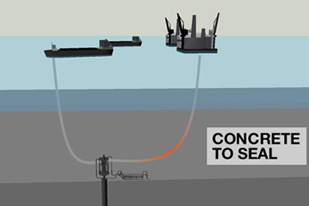BP claims success in ‘static kill’
Mud and cement pumped into oil well to plug leak in Gulf of Mexico.

Barack Obama, the US president, welcomed the announcement.
“The long battle to stop the leak and contain the oil is finally close to coming to an end,” he said on Wednesday.
Robert Gibbs, Obama’s spokesman, said the president might be willing to lift a moratorium on offshore drilling within the next few months. Obama imposed the ban shortly after the Deepwater Horizon exploded.
‘End in sight’
A US government report published on Wednesday said that nearly three quarters of the spilled crude had now been mopped up or dispersed.
| IN DEPTH | |
|
US scientists said in the inter-agency report that burning, skimming and direct recovery had removed one quarter of the oil.
Another 25 per cent had naturally evaporated or dissolved, and 24 per cent had been dispersed, either naturally or chemically, the report said.
The rest was either on or just beneath the water’s surface as “light sheen or weathered tarballs,” had washed ashore or was buried in sand and sediments at the sea bottom, the scientists said.
However, more than one million barrels of oil remains in the Gulf, four times the estimated 257,000 barrels that spilled into Prince William Sound from the Exxon Valdez tanker in 1989.
Counting the cost
If BP is found guilty of negligence over the spill, the flow rate of 62,000 barrels a day means it could face up to $17.6bn in fines.
 |
| The ‘static kill’ operation involved injecting mud and cement into the well to seal the leak |
The firm has also set up a $20bn fund to pay claims from individuals and businesses hit by the disaster.
Gulf fishing communities and business owners are still counting the cost of the spill, which forced the closure of large swaths of rich fishing grounds and dealt a severe blow to local tourism.
Thad Allen, the government’s point man for the spill, said the task is becoming more urgent because peak hurricane season is just around the corner.
The spill is the world’s largest accidental release of oil, surpassing the 1979 Ixtoc well blowout in Mexico’s Bay of Campeche that spilled out almost three million barrels.
